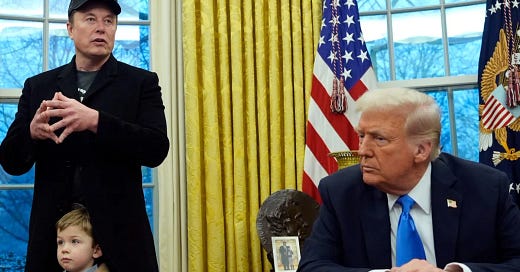DOGE and GOP Hill Angst
What happens after Musk's algorithms pry into the Pentagon fiscal sinkhole? Would Trump throw GOP lawmakers under the bus to achieve his DOGE goals?
In the early rounds of the DOGE offensive to ostensibly cut "waste, fraud and abuse," Team Trump and Elon Musk have had no effective resistance from a helpless, hapless Democratic opposition. The White House has marched up and down the field at will; points are on the board; MAGA partisans are ecstatic.
The DOGE team's payment-mapping algorithms have probed federal agencies like USAID, the Department of Education, the Centers for Disease Control (CDC), the National Institute of Health (NIH), HHS and the FDA, among others.
The result: Grants are frozen, personnel are being jettisoned, Democrats are overwhelmed fighting a multi-front barrage of daily DOGE news and other White House policy initiatives.
But it's still early in the game. For both sides, the adage things are never as good they seem — and vice-versa — is in play.
And a ripple of Hill GOP dissent is already at hand.
Punchbowl (2/17) reports:
Several GOP Senators have complained about the scale or depth of some of the DOGE-related cuts, including Sens. Susan Collins (Maine), Lisa Murkowski (Alaska), John Curtis (Utah), Katie Britt(Ala.) and Bill Cassidy (La.).
These Republicans have been careful to make clear that they’re not defending wasteful government spending or criticizing President Donald Trump or Musk. They are warning, though, that some of this may have gone too far, too fast, possibly even hurting their home states in the process.
Sen. Collins, up for reelection in '28, is already going full neg -- DOGE’s NIH cuts are "poorly conceived" and "devastating."
Sen. Britt is more muted. But she’s already employing time-honored Capitol Hill bromides signaling possible opposition later in the process: NIH funding reductions, she says, must be "smart" and "targeted." The implication: DOGE cuts may not meet this standard.
But it’s also incumbent on Musk and the White House to better explain and document what they’re uncovering. Finding “wasteful” programs is one thing — but broad, sweeping allegations of “fraud” require better documentation than what’s now being displayed as “proof” on the DOGE website. Musk is largely getting the benefit of the doubt thus far in terms of public opinion.
But the “findings” part of DOGE’s game requires improvement and more specificity. This should be job one at the White House.
Rubber Meets Road When DOGE Digs into Pentagon Spending
Musk is now deploying his DOGE team at the Pentagon — the Big Kahuna of fiscal sinkholes.
With a FY 2024 budget of nearly $825 billion, the Department of Defense epitomizes a federal bureaucracy in need of sunlight and transparency.
The sweetheart deals and opaque, decades-long “arrangements” cloaked by institutionalized secrecy are as big a sham and taxpayer rip-off as any recently-exposed USAID spending outrage.
Once the Pentagon’s “proctology exam” (Musk’s words) begins in earnest, one should expect to hear high-pitched reaction from generals and cries from GOP and Democratic lawmakers alike calling for “appropriate congressional input” and “informed oversight.”
That would result only is delay and inaction.
That’s just what Congress as an institution does… delay, deliberate and dither… Regardless whether Republicans or Democrats control the legislative branch.
Would Trump Throw Lawmakers in Tough Races Under the Bus?
Trump is clearly on a mission with DOGE.
He's also a lame duck who cares far more about enacting his agenda and shaping his policy legacy than the well being of GOP Senate and House members in tight races.
He's never hesitated to throw Republicans under the bus if they wander off the MAGA reservation or oppose his will.
All things being equal, it’s reasonable to assume Trump wants to retain Senate and House GOP majorities in the 2026 mid-terms.
But it’s more reasonable to assume the President intuitively understands the window is tight to enact the historic federal budgetary transformation he seeks.
And if a few Senate and House seats are lost in the process, so be it.
National Republican Senatorial Committee (NRSC) and National Republican Congressional Committee (NRCC) Chairmen Tim Scott (R-SC) and Richard Hudson (R-NC), respectively, would be well advised to tell lawmakers in tough re-elects to prepare for the worst when it comes to dealing with the local implications of DOGE budget-busting.
DOGE 2025 as BRAC Late 80s
Following the Cold War's late 80’s conclusion, military downsizing included the need to close dozens of bases across the nation. Lawmakers of both parties predictably resisted as bases in their states and districts remained vital, they rightly claimed, to the local employment base.
The federal Base Realignment and Closure (BRAC) commission was established to determine which bases to shudder. Significantly, BRAC helped insulate lawmakers from having to actually vote against local base closures. Procedurally, the entire list of BRAC-approved base closures was given to Congress and provided the opportunity to reject the entire list by passing a resolution of disapproval.
Congress did not do so, the bases were closed, and billions were saved.
But while DOGE and BRAC are not remotely analogous in scope, DOGE still serves as a vehicle of sorts for Trump to claim he and Musk are the ones really taking the heat — and GOP lawmakers need to get on board, stop being apologists for waste, fraud and abuse, and suck it up.
Would Trump do that? Absolutely.
Critics accuse Trump of fomenting a constitutional crisis.
That’s nonsense. A dysfunctional Congress and its chronic, profligate spending under both parties is the culprit.





